
Vitoria-Gasteiz, also alternatively spelled as Vittoria in older English-language sources, is the seat of government and the capital city of the Basque Country and of the province of Álava in northern Spain. It holds the autonomous community's House of Parliament, the headquarters of the Government, and the Lehendakari's official residency. The municipality—which comprises not only the city but also the mainly agricultural lands of 63 villages around—is the largest in the Basque Country, with a total area of 276.81 square kilometres (106.88 sq mi), and it has a population of 253,093. The dwellers of Vitoria-Gasteiz are called vitorianos or gasteiztarrak, while traditionally they are dubbed babazorros.
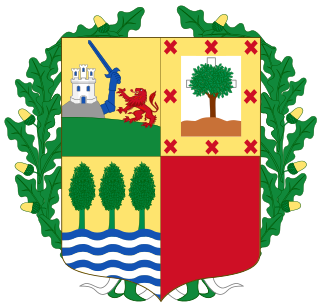
The President of the Basque Government, usually known in the Basque language as the Lehendakari, is the head of government of the Basque Autonomous Community. The lehendakari leads the executive branch of the regional government.

Villabuena de Álava in Spanish or Eskuernaga in Basque is a municipality located in the province of Álava, in the Basque Country of northern Spain. It is famous for its production of top quality wines. The village has 48 wineries ranging from small family-owned businesses to larger bulk-production wineries. The centre of the village contains one of the oldest and most decorated churches in the Basque region, the Nearby is Hotel Viura, a boutique hotel.

The Statute of Autonomy of the Basque Country of 1979, widely known as the Statute of Gernika, is the legal document organizing the political system of the Autonomous Community of the Basque Country' which includes the historical territories of Alava, Biscay and Gipuzkoa. It forms the region into one of the autonomous communities envisioned in the Spanish Constitution of 1978. The Statute was named "Statute of Gernika" after the city of Gernika, where its final form was approved on 29 December 1978. It was ratified by referendum on 25 October 1979, despite the abstention of more than 40% of the electorate. The statute was accepted by the lower house of the Spanish Parliament on November 29 and the Spanish Senate on December 12.

The Basque Parliament is the legislative body of the Basque Autonomous Community of Spain and the elected assembly to which the Basque Government is responsible.
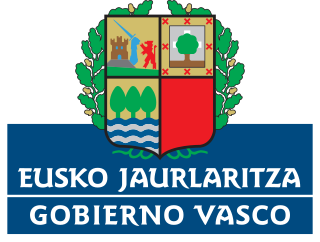
The Basque Government is the governing body of the Basque Autonomous Community of Spain. The head of the Basque government is known as the Lehendakari. The Lehendakari is appointed by the Basque Parliament every four years, after a regional election. Its headquarters are located in the Lakua district of Vitoria-Gasteiz in Álava.
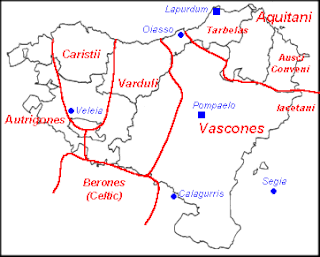
Veleia was a Roman town in Hispania, now located in the province of Álava, Basque Autonomous Community, Spain. The site is located in the municipality of Iruña de Oca, 10 kilometers west of Vitoria. The town was an important station on the Roman road ab Asturica Burdigalam that ran parallel to the coast of the Bay of Biscay. At its apogee, the city could have been inhabited by some five to ten thousand people, and apparently went through different cycles of prosperity and decline into the Early Middle Ages until it was finally abandoned.

José Antonio Ardanza Garro is a former Spanish politician that became the second elected Lehendakari (President of the Basque Autonomous Community, Spain after the approval of the Statute of Autonomy. He was in office between 1985 and 1999.

Condado de Treviño is a municipality in the province of Burgos, autonomous community of Castile and León, Spain. This municipality and the geographically smaller La Puebla de Arganzón make up the enclave of Treviño. Although the enclave is part of Burgos it is surrounded by the province of Álava, part of the autonomous community of the Basque Country. The seat of the municipality is Treviño.
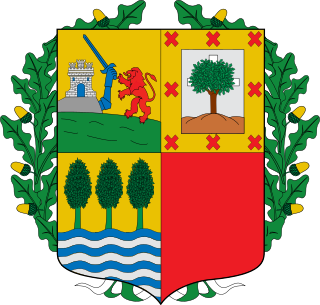
The current Basque coat of arms is the official coat of arms of the Basque Country, Autonomous community of Spain. It consists of a party per cross representing the three historical territories of Álava, Gipuzkoa and Biscay, as well as a fourth, void quarter. The arms are ringed by a regal wreath of oak leaves, symbolic of the Gernikako Arbola. The fourth quarter constituted since the late 19th century the linked chains of Navarre; however, following a legal suit by the Navarre Government claiming that the usage of the arms of a region on the flag of another was illegal, the Constitutional Court of Spain ordered the removal of the chains of Navarre in a judgement of 1986.
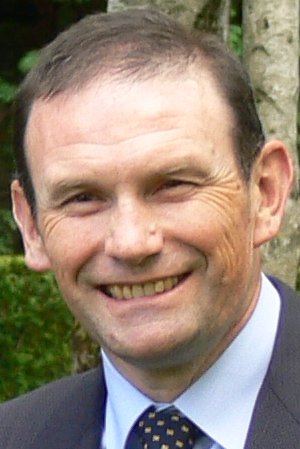
The 2009 Basque regional election was held on Sunday, 1 March 2009, to elect the 9th Parliament of the Basque Autonomous Community. All 75 seats in the Parliament were up for election. The election was held simultaneously with a regional election in Galicia. It would be the first time that the elections for two of the Spanish "historical regions"—namely, those comprising Andalusia, Catalonia, Galicia and the Basque Country itself—were held simultaneously. This would evolve into an unwritten convention in subsequent years, with Basque and Galician elections being held concurrently in 2012, 2016 and 2020.

The Basque Country, also called Basque Autonomous Community, is an autonomous community in northern Spain. It includes the Basque provinces of Álava, Biscay, and Gipuzkoa.
The General Assembly is the name of the legislative body (legislature) of the territories of Biscay, Gipuzkoa, Alava and Navarre, and the elected assemblies to which the Government of each territory is responsible.
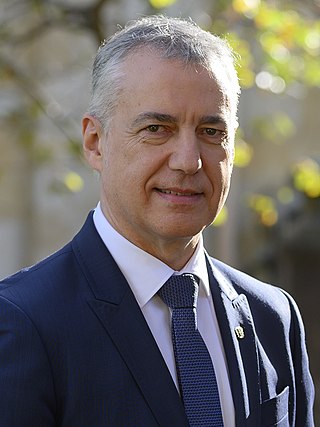
Íñigo Urkullu Renteria is a Basque politician, and the Lehendakari (President) of the Basque Government since 2012.

Araia is a village in the province of Álava, Basque Country, Spain. It is the capital of the municipality of Asparrena. It has a population of 1,218 inhabitants (2006) and has an altitude of 604 meters. One of medieval roads from the port of San Adrián to the Plains of Alava passed through Araia. It was an important pilgrimage and trade route.

The 2012 Basque regional election was held on Sunday, 21 October 2012, to elect the 10th Parliament of the Basque Autonomous Community. All 75 seats in the Parliament were up for election. The election was held simultaneously with a regional election in Galicia. Lehendakari Patxi López announced the parliament's dissolution half a year ahead of schedule as a result of the People's Party (PP) withdrawing their support from his government, prompting Galician president Alberto Núñez Feijóo, who had been scheduling a snap election in Galicia to be held at some point throughout late 2012, to make his decision to have a simultaneous vote.

The Museum of Fine Arts of Álava is located in Vitoria-Gasteiz, the capital of the Basque Country. Since its opening in 1942, it has undergone many transformations. The museum is dedicated to Spanish art from the 18th to the 20th century and to Basque art from the period 1850–1950.

Lehendakaritza or the President's Office is the department of the Basque Government responsible for the affairs of the lehendakari and issues like communication, open government, foreign affairs and peace. This department is led by the President.

The General Assembly of Álava is the parliament of Álava, a province of Spain and a historical territory of the Basque Country.
Julen Guimón (1931–2001) was a Basque-origin conservative Spanish jurist and politician who played a significant role in the politics of the Basque region until his retirement in 1990. He was among the signatories of the Ajuria Enea Pact which led to the pacification of the Basque Country.

















